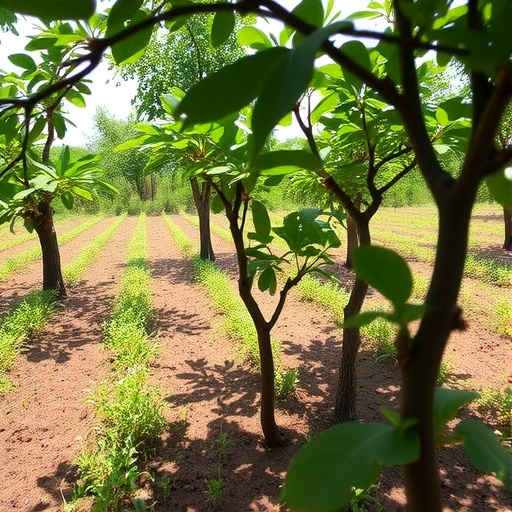In recent years, the intricate relationship between agricultural practices and ecological sustainability has captured the attention of researchers and policymakers worldwide. A recent study by Guiatin and Lompo explores a critical aspect of this relationship, particularly focusing on the dynamics of agroforestry in the forest-adjacent lands of Burkina Faso, West Africa. The research underlines an alarming trend: the dependency of farmers on synthetic inputs, which threatens the delicate balance of agroforestry systems that are critical for environmental sustainability and food security in the region.
Agroforestry systems, characterized by the integration of trees, crops, and livestock, play a pivotal role in enhancing biodiversity, improving soil health, and providing a myriad of ecosystem services. In Burkina Faso, these systems have been traditionally practiced by rural communities to optimize land use and support livelihoods. However, the increase in reliance on chemical fertilizers and pesticides poses an existential threat to these multifaceted systems. Farmers are increasingly turning to synthetic inputs in their pursuit of immediate agricultural productivity, inadvertently compromising the sustainability of the very systems that sustain them.
One of the striking observations from the study is that the drive for higher yields, often induced by market pressures and the need for food security, leads to a vicious cycle of dependency on synthetic fertilizers. Farmers who adopt these inputs often experience short-term gains in productivity, yet they become ensnared in a continuous cycle of fertilizer dependence. Over time, this dependency reduces soil fertility and disrupts the complex interactions that underlie agroforestry systems, diminishing their resilience against environmental stressors such as drought and soil degradation.
The research highlights that chemical inputs not only disturb the soil ecosystem but also can leach into water sources, causing a cascade of environmental issues. This contamination can adversely affect local water quality, endangering both human health and aquatic ecosystems. The repercussions are far-reaching, influencing community well-being and the overall health of the landscape. The study emphasizes the need for a paradigm shift where agroecological practices might offer an alternative pathway to enhance productivity while safeguarding the integrity of agroforestry systems.
Importantly, the researchers argue that revitalizing traditional agroforestry practices, which emphasize the use of organic matter and biodiversity, could pave the way for sustainable agricultural methodologies. These methods have been historically rooted in local knowledge and practices, leveraging the benefits of natural nutrient cycling and pest control. By shifting the focus away from synthetic inputs, rural communities could revive their agroforestry systems, enhancing their adaptive capacities and resilience to climate change.
Guiatin and Lompo further discuss how governmental policies and development programs can play a crucial role in this transformation. By prioritizing support for agroecological initiatives over synthetic input subsidies, authorities can encourage farmers to adopt sustainable practices that restore ecological balance. Educational programs aimed at increasing awareness and training on sustainable agricultural methods could empower farmers to make informed choices that align with both their economic needs and environmental stewardship.
Cultural factors that perpetuate the dependency on synthetic inputs must also be addressed. Many farmers remain attached to these inputs due to cultural beliefs about modernity and progress in agriculture. Changing these perceptions requires a concerted effort to demonstrate the efficacy and benefits of sustainable practices, not just from an ecological standpoint but also in terms of economic viability.
The study calls for collaborative efforts between local communities, researchers, and policymakers to create integrated approaches that promote agroecological practices while maintaining agricultural productivity. Such collaboration will be essential in creating a resilient agricultural framework that stands against the backdrop of climate change challenges, ensuring food security for future generations in Burkina Faso and beyond.
To ignite this change, grassroots movements encouraging sustainable practices must be amplified. Farmers who have embraced agroecological methods successfully can serve as role models, helping others understand the transition’s benefits and paving the way for wider adoption. By fostering a community of practice around sustainable agroforestry, the region can cultivate a robust support system that champions resilience in farming systems.
Realizing the vision for sustainable agroforestry in Burkina Faso calls for innovative approaches that blend modern science with traditional knowledge. The engagement of local farmers in research and development initiatives can foster a sense of ownership and responsibility toward sustainable practices. These initiatives can generate vital locally relevant solutions adapted to specific environmental and socio-economic contexts.
In summary, the research conducted by Guiatin and Lompo raises pivotal questions about the future of agriculture in Burkina Faso and similar regions worldwide. The findings make it abundantly clear that the road ahead requires a collective commitment to redefine agricultural practices, shifting away from synthetic dependency to ecological sustainability. It is within this framework that a viable future for agroforestry can be secured, ensuring both the integrity of ecosystems and the livelihoods of countless farmers in the years to come.
A comprehensive understanding of the challenges faced by agroforestry systems and the urgent need to address synthetic input dependency is crucial for the ongoing discourse on agricultural sustainability. As humanity grapples with pressing environmental challenges, the insights gleaned from this study offer a roadmap for achieving a harmonious balance between agricultural productivity and ecological health, not just in Burkina Faso but across the globe.
Subject of Research: The impact of synthetic input dependency on agroforestry sustainability in Burkina Faso.
Article Title: Farmer dependency on synthetic inputs threatens agroforestry sustainability in forest-adjacent lands of Burkina Faso (West Africa).
Article References:
Guiatin, E., Lompo, D.J.P. Farmer dependency on synthetic inputs threatens agroforestry sustainability in forest-adjacent lands of Burkina Faso (West Africa).
Discov Sustain 6, 1177 (2025). https://doi.org/10.1007/s43621-025-01862-x
Image Credits: AI Generated
DOI: 10.1007/s43621-025-01862-x
Keywords: Agroforestry, Sustainability, Synthetic Inputs, Burkina Faso, Eco-agriculture.




